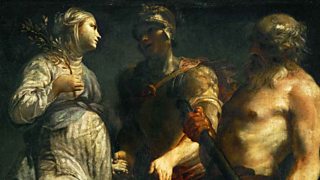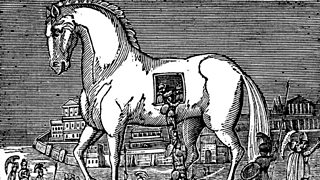What did the Aeneid ever do for us?
It may not have given us plumbing or democracy but Virgil’s Aeneid was world-changing. So what makes it so important? And how can we name-drop it confidently without ever having read it?

What’s the story?
#spoileralert

It’s a tale of Aeneas’s journey to the underworld; our plucky hero must cross the Styx, journey from Troy to Rome and then beat the Latins, notoriously the most difficult section in Strictly Come Dancing.
Aeneas and crew get blown off course and land in Carthage, where they meet Dido, queen of Carthage and singer of no 1 hit single “Thank You”. Aeneas tells her about his journey, and Dido promptly falls in love with him. He hurriedly remembers his quest to save Rome and decides to leave, whereupon she makes a huge funeral pyre of all his possessions and then kills herself with his sword. Bit of an over-reaction.
From there Aeneas is guided to the underworld by the Sibyl of Cumae, where he meets his dead father, who shows him his potential as hero (it’s a bit like Superman, this bit, isn’t it?)
They arrive in Italy where King Latinus is hoping Aeneas’ll marry his daughter Lavinia (GSOH, enjoys tennis and reading). But Lavinia’s mother Amata wants Lavinia to marry her current boyfriend, Turnus. Turnus and Amata incite hatred for Aeneas which they’re able to turn into a full-on war once a member of Team Aeneas accidentally kills a local’s pet stag. Oh come on, we’ve all got a pet stag.
Aeneas’ mother Venus gives him some Vulcan weapons (fashioned by Mr Spock, presumably). On his return, it is decided that the war should be brought to an end with a hand to hand duel between Aeneas and Turnus (presumably with Lavinia shouting “Leave ‘im Turnus, he ain’t worf it”). Aeneas is wounded in the thigh, and then kills Turnus.
Spin City
It was written just after the Roman Republic fell; Octavian had trounced Cleopatra’s army and Romans were beginning to ask if Rome really was quite the indomitable force it liked to view itself (plumbing notwithstanding). You could consider it the first example of a sexed up dossier.
Augustus Caesar, the newly minted Emperor, full of crusading zeal, embarked on a bit of a re-brand, and the Aeneid was Virgil’s way of supporting Augustus Caesar’s aims. “You’ve never had it so good.”
Rewriting history
Virgil did a really good job of convincing the Romans that the Empire under Augustus Caesar would be grand, prosperous, stable, and ordered, as opposed to the scatty, over-emotional Italianate world, in which everyone ate Neapolitan ice cream and punted about in gondolas.
Any themes?
Heaps. Homeland (not the one with Claire Danes crying) providing identity, the bond between fathers and sons, the importance of accepting the workings of the gods, and moral probity. All the light, frivolous stuff.
How did he write it?
Slowly, it’s safe to say. Three lines a day (the equivalent speed of a 12 year old writing thank you letters). Twelve books of the poem occupied him for about ten years from 29 BCE until his death in 19 BCE.
Virgil died before the work was finished, and asked as a dying wish, for it to be burned. Augustus Caesar felt the work was valuable and distributed it anyway, proving he was not the sort of man to take a deathbed wish remotely seriously.
But if you ever feel overwhelmed by the huge influence of this work, just remember that the whole thing was basically a poetry slam – Virgil was out to beat his rival Homer (the poet, not the Simpson). D’oh!
-
![]()
Book of the Week
Hear Nobel Prize-winning poet Seamus Heaney's translation of Virgil's Aeneid, Book VI. Read by Ian McKellen.
-
![]()
In Our Time: The Aeneid
Melvyn Bragg and guests discuss ‘The Aeneid’, Virgil's great epic poem about Rome.
-
![]()
In Our Time: The Trojan War
Melvyn Bragg and guests discuss the Trojan War, a central event of Ancient Greek mythology.



